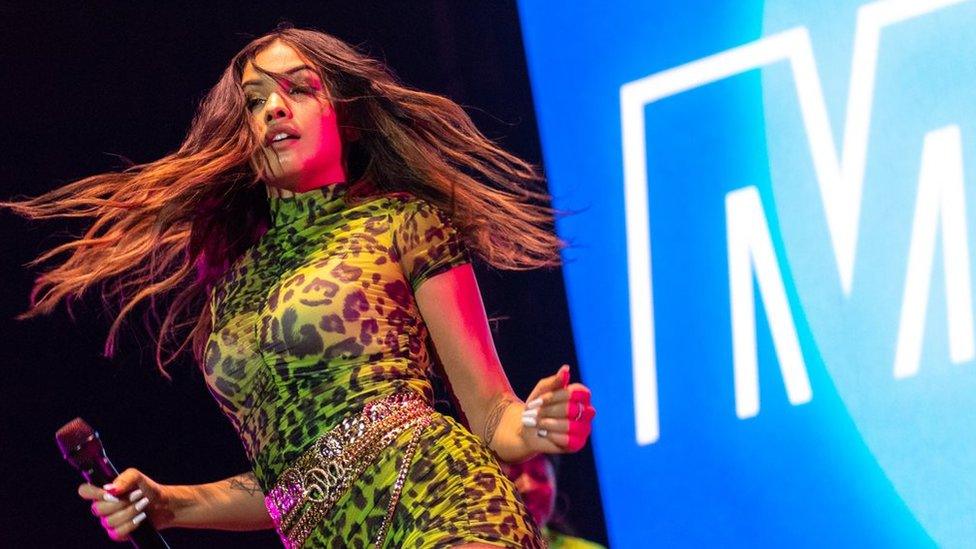The database that means festivals have 'no excuses' on gender balance
- Published
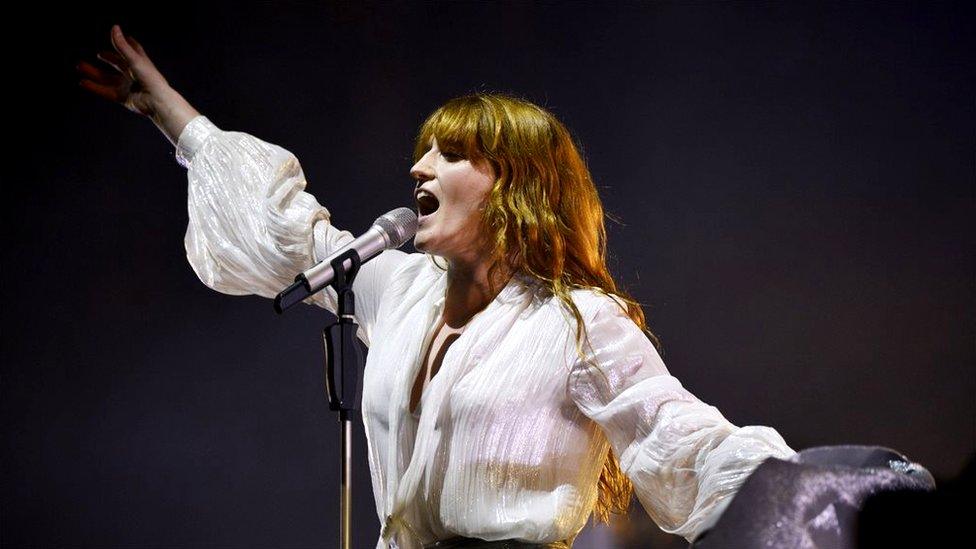
Florence + The Machine is one of the few women to headline a UK festival in the last five years
Festivals hoping to achieve gender balance on their line-ups have been given a major helping hand - in the form of a massive spreadsheet.
The document lists every female artist signed to a record label or releasing music independently in the UK.
The list of more than 2,000 singers and bands was compiled by former CEO of the Ivors Academy, Vick Bain.
"Now there is no reason for people to say, 'it's really difficult to find all these women,'" she tells the BBC.
"I've done that work for them, so there's no excuse."
The spreadsheet, which she has dubbed "The F-list", is freely available on her website, external and will be continually updated with the details of solo artists and groups with at least one female member.
It covers every genre from rock and pop to jazz and classical, and also include songwriters and composers, making it a resource for the whole industry.
Female headliners?
The issue of gender balance at festivals has been a talking point since 2015, when the music blog Crack in the Road tweeted a doctored image of the Reading and Leeds poster, erasing the names of all the male performers. Only 10 remained.
Writer and promoter Lucy McCourt has carried on the tradition, and her redacted posters for the 2020 festival season, external exposed the industry's lack of progress.
Separate analysis by the BBC suggests only 8% of the artists headlining the UK's major festivals this summer are female.
It was figures like these that prompted Bain to take action.
She had studied the music industry's gender gap for a survey called Counting The Music in 2019, discovering that just 19% of the artists signed to record labels in the UK are women.
After reading about this year's festival season, she realised her research could be turned into a resource for festival bookers and promoters.
"I don't think most people have been prepared to put in the hours to find out all of this information - so they can use my list [instead]," she says.

The document will prove useful to the 300-plus festivals and music organisations that have signed the Keychange initiative, external, with the aim of achieving a 50/50 gender balance by 2022.
Another person who might be interested is Geoff Ellis, who runs Scotland's TRNSMT festival.
He drew criticism earlier this year after saying it would be "several years" before a festival line-up could achieve a 50/50 balance between male and female acts.
"There are far, far fewer female artists," he told Radio 1's Newsbeat. "We need to get more females picking up guitars, forming bands, playing in bands."
Artists including KT Tunstall and Dodie attacked his comments - noting that Spain's Primavera festival had already achieved gender parity - while fans suggested artists who'd be suitable for the bill, including Billie Elish, Dua Lipa, Lizzo, Haim, Courtney Barnett, Angel Olsen and Cate Le Bon.
"I kept seeing more and more people putting forward female artists on social media - and I thought, 'Well, I've got thousands,'" Bain recalls.
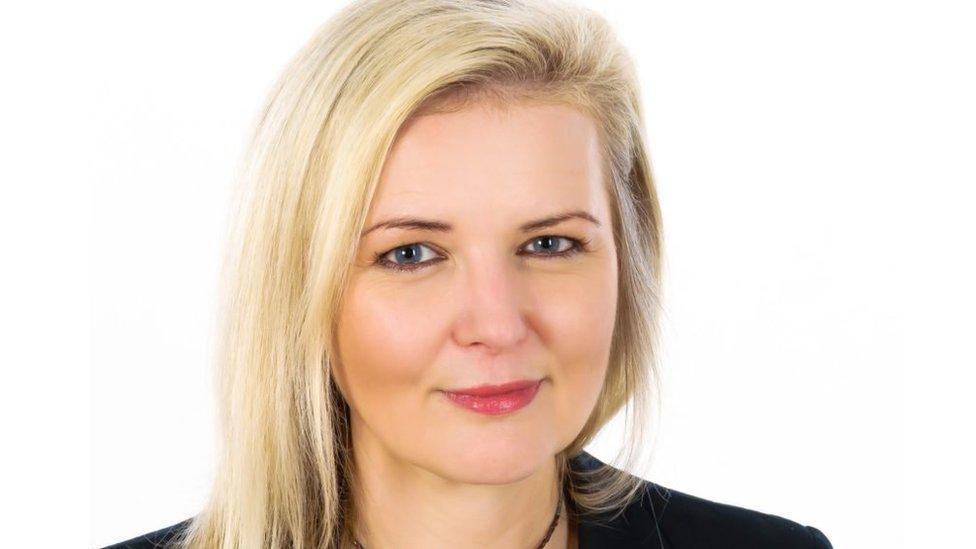
Vick Bain: "I just hope that event planners, promoters and festival bookers extend their horizons."
She thinks many people in the music industry are "comfortable in their own little world" and rely on "regular rosters" of bands and record labels to populate their festivals.
"Hopefully, I've been able to provide the bigger picture."
Determination
Bain stepped down as the CEO of the Ivors Academy (then known as the British Association of Songwriters, Composers and Authors) in 2018, after a tenure that saw her inducted onto Music Week's Women in Music Roll of Honour and featured on BBC Radio 4's Woman's Hour Power List.
She now works as a freelance music industry consultant and is director of the board of Parents & Carers in Performing Arts (PiPA).
Since publishing her list last week, Bain said had received "three or four-hundred messages" from female artists who want their details included.
"I'm really impressed at how determined and entrepreneurial female musicians are today," she says, adding that she had discovered several new favourite bands, including Nicki Wells, external and Deep Deep Water, external, through her research.
Bain acknowledges that festivals will always try to secure sets from A-listers like Adele, Taylor Swift and Florence + The Machine. The real work lies further down the bill.
"It's definitely at that entry level and mid-level stage that people can look at this document and get ideas," she says.
"The women who've been contacting me are doing everything possible to get noticed. They want to go out and play on those stages.
"That's a brilliant opportunity."

Follow us on Facebook, external, or on Twitter @BBCNewsEnts, external. If you have a story suggestion email entertainment.news@bbc.co.uk, external.
- Published13 February 2020
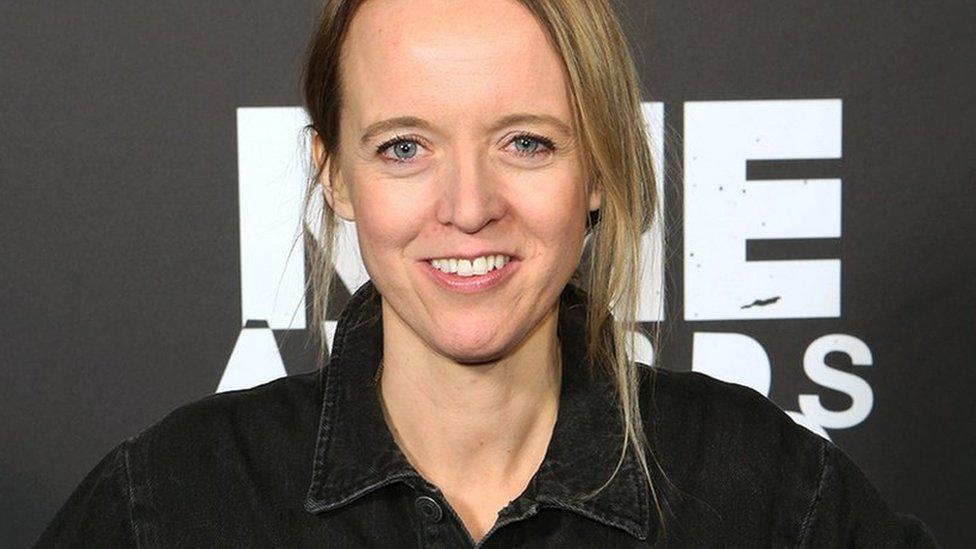
- Published12 February 2020
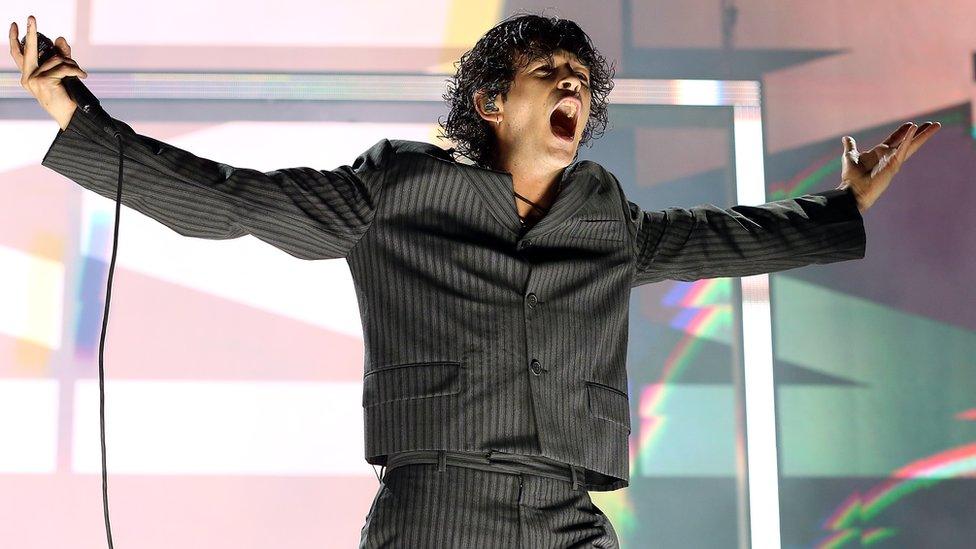
- Published14 January 2020
